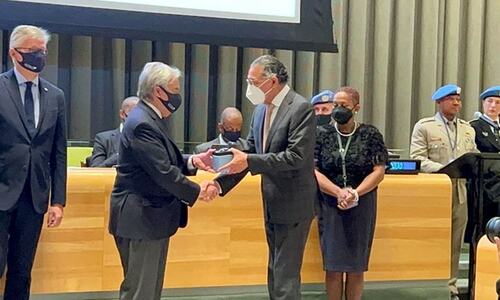UNITED NATIONS: Pakistan has said at a UN non-proliferation debate this week that states have a ‘legitimate right’ to avail dual-use technologies and materials, while keeping non-state actors away from those.
India, however, used the open consultations of the UN Security Council on non-proliferation to insist that “new and emerging technologies” increase the risk of non-access actors getting their hands on weapons of mass destruction (WMDs).
Pakistan argued that “insecurity of states” was “the principal driver of proliferation” and it “must be unreservedly addressed.”
“The right to access technologies and participation in the decision-making processes regarding global regulation of technology should also be enjoyed by all states in a non-discriminatory manner,” Pakistani delegate Gul Qaiser said.
“The multilateral export-control regimes (MECRs) must be democratised. The arbitrary entity listing as well as discriminations, exceptions and waivers should be eliminated.”
Pakistan also emphasised the need to prevent non-state actors from accessing sensitive technologies but said that “the legitimate rights of states to use dual-use technologies and the materials for peaceful purposes must be safeguarded” as well.
Mr Qaiser warned that access to materials, technologies and the equipment should not be monopolised by a minority of technology holders.
“Multilateral export-control regimes (MECRs) should also not be used by a few States as instruments of coercion to further their political and strategic interests,” he added.
On April 28, 2004, the UN Security Council unanimously adopted resolution 1540, which affirms that the proliferation of nuclear, chemical, and biological weapons and their means of delivery “constitutes a threat to international peace and security.” The resolution obliges states to refrain from developing, acquiring, manufacturing, possessing, transporting, or using nuclear, chemical, and biological weapons and their means of delivery.
Indian representative A Amarnath claimed that “the access to these WMDs by terrorists and other non-state actors adds a serious dimension to threats posed these weapons.”
In an indirect reference to the Taliban-controlled Afghanistan, the Indian delegate said: “a terrorist group with considerable territory under its control can develop and deploy these deadly weapons within a short period of time.” That’s why, he said, it was important to prevent “terrorist groups from acquiring and using weapons of mass destruction.”
Pakistan’s statement at the general debate conveyed its consistent view that international instruments and standards designed to address threats to international peace and security posed by the WMDs, should be developed through inclusive and multilateral negotiations.
Pakistan informed the committee that as a responsible nuclear weapons state and a member of the Security Council, it has successfully implemented its obligations under the resolution 1540 to strengthen the global framework for non-proliferation of nuclear, biological, and radiological weapons and materials to non-state actors.
Published in Dawn, June 3rd, 2022















































Dear visitor, the comments section is undergoing an overhaul and will return soon.